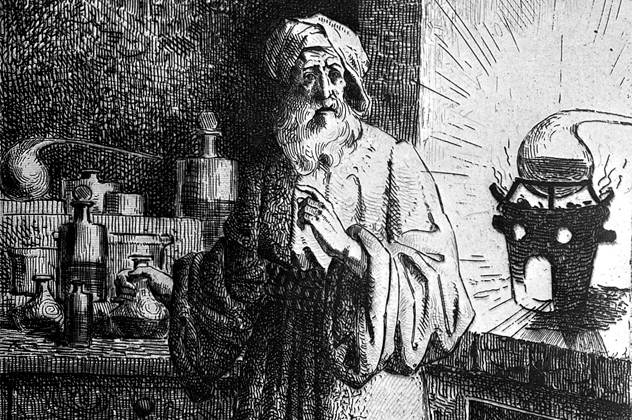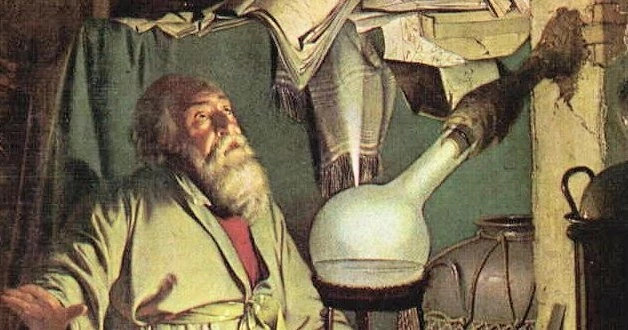Accidentally found phosphorus when refining urine to prepare gold
Many people still don't understand why Hennig Brand thinks urine can make other metals turn into gold after it reaches its maximum.
Find phosphorus when refining urine to prepare gold
Great inventions or innovations of human beings are often made up of two factors, the constant effort in the process and the coincidence. The discovery of the element of phosphorus is no exception to this rule when a German alchemist Hennig Brand found the 15th element in the periodic table system when he tried to empty her urine. The goal is to find a way to make gold.

Like all other alchemists in history, Hennig Brand has been searching for ways to refine gold from things that are not gold. Many people still do not understand why he thought that urine could make other metals turn into gold after being exhausted to the maximum extent, many ideas later deliberately mocked him with association. between the yellow of urine and that precious metal. However, no one can deny his contribution to the chemical industry when he finds phosphorus in his urine instead of finding a way to make gold.
While working in Hamburg in 1669, Brand discovered the pale green luminescence of the residue in the flask when she had a urine residue. he said that he finally found the "philosophical stone" capable of turning other metals into gold. In the view of alchemists of the time, the philosophical stone needed to be luminescent. Of course, phosphorus cannot turn precious metals into gold, does not give us immortality, but visible light phosphorus has attracted alchemists. Hennig Brand also tried to keep his discovery a secret, but he later resold the recipe for David von Krafft.

German alchemists used the element's luminescence and performed performances in the living rooms to earn a living. The famous chemist Robert Boyle, after acquiring a phosphorus modulation formula, accidentally performed with phosphorus in 1680 when he accidentally met David von Krafft and soon established a production workshop. out pretty much pure phosphorus . One year this workshop can separate 25kg of phosphorus. This capacity needs a urine of a whole village.
Alchemy has a history of thousands of years. It is a precursor to modern chemistry and has a profound effect on ancient science and technology as well as human life. The purpose of alchemy is to study how to convert ordinary metals such as lead into precious metals such as gold or the method of practicing immortality . Alchemy uses Aristoteles' perspective as a theoretical basis: it is possible to convert this substance into another substance, the metal into another metal.
The idea of making gold from metal often flourished from the old days when the development of trade gradually turned gold into the most precious metal that brought money and power to people.

Long before BC, in Egypt, India, China and ancient Greece it was known that gold could be mixed with silver, copper and many other metals. So there is artificial gold by adding copper and other metals to gold. In addition, people also mixed white and red copper tin into copper-tin alloy with the same color as gold. That seems to confirm that it is possible to turn other metals into gold. In 296, the Roman Emperor was forced to decree to abolish the above gold preparations because fake gold flooded the market. In order to evade the wanted warrant, alchemists ran from Egypt to Babylon, Syria and set up laboratories to persistently turn ordinary metal into gold.
During the study, alchemists contributed to finding new compounds: metal (Bismuth, Zinc), salt origin (ammonium), inorganic acids (H 2 SO 4 , HCl, HNO 3 ). or aqua water. In addition, they have also completed many important experimental techniques for today's chemical bases such as calcination, distillation, dissolution, filtration, evaporation, crystallization, sublimation, .

Today, gold making is still a pursuit of some scientists, who understand the nature of gold as well as its nucleus. Therefore, the conversion of other cheap metals into gold is feasible but requires very high technology, expensive and uneconomical, so studies of creating gold in this direction are hardly pursued. Now there is a new research direction that is not gold, but extracting gold in nature.
Based on the huge amount of gold available in the oceans as well as the amount of gold falling in the poor ore, people have the idea of using genetic modification technology to create seaweed grounds capable of absorbing gold in seawater. as well as grass capable of absorbing high gold in the soil to fill the surface of poor ore. If this research is successful, then we can literally have harvested harvests literally.
- Humans are wasting 'resources' urine
- Switzerland: 43 kg of gold from wastewater
- The Indian famous cow urine contains gold and medicinal drugs
- New discoveries about use
- He: Accidentally found an extremely rare ancient gold ring in the field
- See your urine to see if you are fine or weak
- English: Found the largest natural gold bureau after 500 years, cost 1.5 billion
- 13 surprisingly interesting things about urine
- Using urine to create electricity, by the way, clean up all germs in the urine
- Diagnosis of the disease through urine
- The chemical is dubbed 'the element of the devil'.
- Opaque urine: Causes, diagnosis and treatment
 The most famous scientific failures in history
The most famous scientific failures in history Mysterious genius mechanic and the machine froze time
Mysterious genius mechanic and the machine froze time The son carries the 'bad gene' of genius Albert Einstein
The son carries the 'bad gene' of genius Albert Einstein Isaac Newton
Isaac Newton